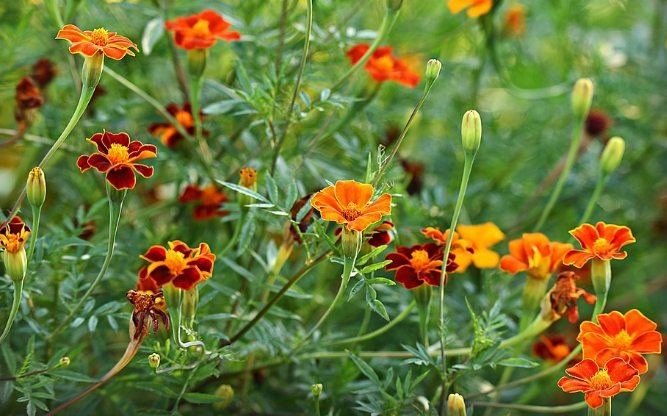Are Marigolds Poisonous To Cats - What to Pay Attention
Written by Ivy
Dec 30 2022

A bright and lovely addition to any home garden, marigolds are cheery and charming little flowers. Marigolds do not deter cats. Cats don't mind them despite the fact that they have a strong smell. In fact, cats occasionally consume marigolds!
Are the Marigold Plants Poisonous to Cats?
The Calendula Officinalis (Pot Marigolds) and the French Marigolds are two different types of the marigold plant. According to the ASPCA website, French Marigolds are only mildly toxic to cats if consumed in large amounts; however, pot marigolds are typically regarded as harmless and non-toxic to cats.
Marigolds are a common plant that are typically grown in flowerbeds or pots in gardens. They reach a medium height and produce large, vibrant flowers that draw insects and, occasionally, your cats.
Due to their natural curiosity, cats use their senses of taste and smell to investigate their surroundings and determine which foods taste good. Because they are strictly carnivores and should consume an animal-based, protein-rich diet rather than vegetation, the majority of cats will not enjoy the taste of plants.
Although the common pot Marigold is non-toxic to cats and not poisonous if they have a nibble on it, the French Marigold is known to be toxic and can cause gastric upset in cats.
The Two Main Types of Marigolds
You should be knowledgeable about the various marigold species before deciding whether your cats can safely be near the marigolds growing in your garden.
Marigolds are classified into two different types: calendula officinalis and tagetes. Calendula officinalis is often known as the "pot marigold," while tagetes are more commonly known as "French marigolds."
Pot marigolds are part of the Calendula genus and are not technically a marigold by definition. French marigolds are part of the Tagetes genus like all other marigold species.
Cats and dogs are thought to be unaffected by pot marigolds' toxicity. They are known by a variety of names, including calendulas, Mary buds, gold blooms, Scotch marigolds, and common marigolds. (Read More: When Do Marigolds Bloom)
However, tagetes can be harmful to animals.
Can You Grow Marigolds With Cats?
You can grow Pot Marigolds around your cat without any problems, but you should stay away from growing French or Tagetes Marigolds, which are toxic. If you have a cat, it is best to grow non-toxic plants rather than taking the chance of growing potentially toxic ones because it is difficult to predict whether your cat will eat the plant or not.
Check whether the Marigold plant you have purchased is the non-toxic or toxic variety as well as whether it contains any harmful pesticides, herbicides, or hormones that are used to promote the plant's growth and beauty but could be harmful if ingested by your cat.

How to Tell the Two Types of Marigolds Apart
If marigolds are already flourishing in your garden, you might be wondering how to tell the two species apart. If they are French marigolds, you might not want to keep them growing where your cat can find them, but the pot variety is alright to keep around.
The French variety of marigolds and other true marigolds are indigenous to South America, southwestern North America, and tropical regions of America. Similar to the pot marigold, calendulas are indigenous to parts of northern Africa and Europe.
It's a good idea to become familiar with some of the visual distinctions between the two flowers.
The marigold seed is straight, black, and has a white tip, whereas the calendula seed is bumpy, brown, and curved.
Under the ideal conditions, calendula flowers can reach a height of two feet. Marigolds can develop into a huge range of sizes. They can be as small as six inches high to as tall as four feet.
When compared to marigold plants, calendula plants have a lovely and sweet scent.
Additionally, the shapes of their petals vary. Marigolds have more rectangular-shaped petals with slightly rounded corners, whereas calendula petals are long and straight.
What Happens If My Cat Eats Marigolds?
Even though pot marigolds are thought to be non-toxic, your cat may still experience some negative side effects from eating them. Mild digestive discomfort is most likely the main symptom. The majority of the time, eating something that isn't typically part of their diet results in this side effect, not the flower itself.
The tagetes species of marigolds can cause your cat more severe issues. Although the toxicity is still regarded as being moderate in comparison to other, more poisonous plants, you should still think about bringing your cat to the vet for a checkup.
The severity and location of symptoms of marigold poisoning can vary. As with most things, the more your cat eats, the more likely which can potentially become more serious. Your cat may experience skin irritation if they come into contact with the plant's sap rather than eating it.
What Should I Do If My Cat Ate Marigolds?
The possibility that your cat may have contacted your marigolds is supported by the evidence you have. If you are unsure of the type of marigolds you have in your garden, what should you do next?
The good news is that adverse effects from eating marigolds are frequently very mild, even for tagetes species. This is especially true when we contrast them with the negative effects your cat might encounter from ingesting incredibly poisonous plants like hydrangeas or daffodils.
While marigold toxicity is considered rather mild, it can be more serious in some cats. Your cat may experience a more severe reaction than the usually mild one most cats do, depending on how much they consumed, their health status, age, and immune system's functionality.
It is best to contact a veterinarian or an animal poison control center if you ever have questions about what plant your cat consumed or how much of it. If your cat is exhibiting severe side effects that need immediate treatment and diagnosis, a trip to the emergency room may be required.
It's a good idea to always have the appropriate supplies on hand because you never know when your curious little cat will get into something they shouldn't. The 24/7 ASPCA Poison Control Center's phone number is (888) 426-4435. If you think your pet may have consumed something poisonous, call this number at any time of the day.
If your cat's symptoms are mild, your vet or the poison control center might advise you to wait it out with them. If your cat is in pain because of the marigold sap, they might advise washing its skin with a shampoo made specifically for pets. They may also tell you to keep an eye open for dehydration as symptoms like vomiting and diarrhea can cause this.
Read More:
Final Thoughts
Not all plants are created equal when you're a flower enthusiast and cat owner. Not every marigold will be risk-free to grow near your inquisitive cat. Make sure you look for pot marigolds by one of their many alternate names if you're looking for a cheerful and lovely perennial for your garden.
FAQs
Are Petunias Poisonous to Cats
Petunias don't harm cats. All parts of the Petunia plant are non-poisonous and non-toxic to cats, so even if your curious cat tried to snack on a leaf or a flower, they would not suffer any ill effects.
Are Marigolds Poisonous to Dogs
Spider plants, ferns and colourful bromeliads and marigolds are all harmless to dogs and cats.
Are Marigolds Poisonous to Babies
Marigolds are not toxic to humans and are edible in small amounts, but eating large quantities may cause minor issues. However, cats, dogs, and other animals may be slightly toxic to marigolds. Keep your pets away from marigolds as much as possible because they can irritate them and cause diarrhea and vomiting.
Latest Updated
- Benefits of Bugleweed - 7 Science-backed Health Benefits
- Bugleweed Dangers & Side Effects - Is It Poisonous?
- How to Plant Evergreen Trees - What You Should Know
- When to Plant Evergreens - Grow Guide for Evergreen Trees
- 12 Wonderful Evergreen Shrubs for Your Garden
- 12 Popular Evergreen Plants with Pictures for Beginners
- When And How To Prune A Lilac Bush Like a Pro
- How to Grow & Care for Lilac Vine (Hardenbergia Violacea)
- Japanese Lilac Tree (Syringa Reticulata) Care & Propagation Guide
- Shumard Oak Pros and Cons - What to Know
Popular Articles
- Winter maintenance of Antirrhinum Majus
- How to Grow Terminalia Mantaly Tree
- How to Grow and Care for Crossostephium Chinense
- How to grow Antirrhinum Majus in spring
- Peristeria Elata (Dove Orchid) Profile: Info & Care Guide
- Underwatered Snake Plant (Sansevieria Trifasciata) - Signs And How To Fix
- How to Care for Brazilian Jasmine Plant (Mandevilla Sanderi)
- How to Grow & Care for Graptopetalum Purple Delight in Summer
- Rosa Chinensis (China Rose): Plant Growing & Care Tips
- How to Care for Baby Sun Rose (Aptenia Cordifolia)